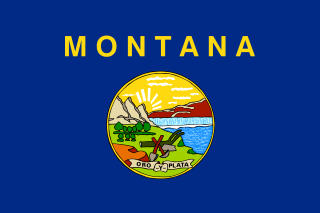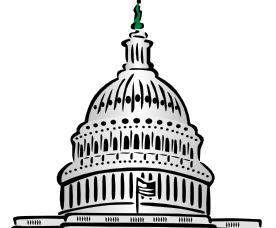May 5, 2017 •
North Dakota Campaign Finance Law Signed into Law
Senate Bill 2343 was signed into law in April to enhance campaign finance reporting requirements and restrict candidates from using campaign funds for personal expenses. The new law makes changes to the disclosure requirements for PACs and multicandidate political committees, […]
 Senate Bill 2343 was signed into law in April to enhance campaign finance reporting requirements and restrict candidates from using campaign funds for personal expenses.
Senate Bill 2343 was signed into law in April to enhance campaign finance reporting requirements and restrict candidates from using campaign funds for personal expenses.
The new law makes changes to the disclosure requirements for PACs and multicandidate political committees, requiring them to file pre-election, supplemental, and annual reports.
Senate Bill 2343 also makes amendments to statements required by measure committees circulating or promoting passage or defeat of initiated or referred measures.
The law becomes effective February 1, 2018, for campaign years beginning after December 31, 2017.
May 5, 2017 •
Hawaii Legislature Adjourns Sine Die
The 29th Hawaii Legislature adjourned sine die on Thursday, May 4. Prior to adjournment, House members elected Rep. Scott Saiki as Speaker of the House. He replaces Rep. Joseph Souki, who resigned after lawmakers failed to come together to pass […]
 The 29th Hawaii Legislature adjourned sine die on Thursday, May 4.
The 29th Hawaii Legislature adjourned sine die on Thursday, May 4.
Prior to adjournment, House members elected Rep. Scott Saiki as Speaker of the House. He replaces Rep. Joseph Souki, who resigned after lawmakers failed to come together to pass certain bills.
Lawmakers passed 233 bills during the 2017 legislative session, including budgets for fiscal years 2018 and 2019.
Pending bills will carry over to the 2018 legislative session.
May 5, 2017 •
News You Can Use Digest – May 5, 2017
National: Guns and Religion: How American conservatives grew closer to Putin’s Russia Washington Post – Rosalind Helderman and Tom Hamburger | Published: 4/30/2017 A significant shift has been underway in recent years across the Republican right. On issues including gun […]

National:
Guns and Religion: How American conservatives grew closer to Putin’s Russia
Washington Post – Rosalind Helderman and Tom Hamburger | Published: 4/30/2017
A significant shift has been underway in recent years across the Republican right. On issues including gun rights, terrorism, and same-sex marriage, many leading advocates on the right who grew frustrated with their country’s leftward tilt under President Barack Obama have forged ties with well-connected Russians and come to see that country’s authoritarian leader, Vladimir Putin, as a potential ally. The attitude adjustment among many conservative activists helps explain one of the most curious aspects of the 2016 presidential race: a softening among many conservatives of their historically hardline views of Russia.
Federal:
Code Pink Protesters at Sessions Hearing Could Face Year in Prison
New York Times – Christopher Mele | Published: 5/3/2017
A jury convicted three Code Pink activists for disrupting Jeff Sessions’ confirmation hearing to be attorney general, including one who apparently laughed during the hearing. Desiree Fairooz, who dressed up as a pink version of Lady Liberty, was found guilty on charges of parading or demonstrating on Capitol grounds and disorderly conduct. Two other activists, Tighe Barry and Lenny Bianchi, were acquitted on a count of disorderly conduct but were convicted on two separate charges of parading or demonstrating during the hearing. Both men dressed up as Ku Klux Klan members, wearing white hooded robes, and stood up before the hearing started. All three could face up to a year in prison.
Lewandowski’s Firm Appears to Offer Trump Meetings
Politico – Kenneth Voogel and Josh Dawsey | Published: 4/28/2017
A firm co-founded by Donald Trump’s original campaign manager Corey Lewandowski appears to have been pitching clients around the world by offering not only policy and political advice, but also face time with President Trump, Vice President Mike Pence, and senior members of their administration. The previously unreported firm, Washington East West Political Strategies, was created by Lewandowski and fellow Trump campaign veteran Barry Bennett, as well as an Azerbaijani oil executive and an American political consultant who works extensively in Russia, to prospect for political business in Eastern Europe. And Lewandowski and Bennett have created different firms with other partners to prospect in the Middle East, Canada, and Central America, Bennett said.
Top Ethics Officer Challenges Trump Over Secret Waivers for Ex-Lobbyists
New York Times – Eric Lipton | Published: 5/1/2017
The Office of Government Ethics (OGE) sent a letter to the White House and all executive branch agency heads asking for copies of any waivers the Trump administration may have granted to appointees exempting them from ethics rules. The OGE’s director, Walter Shaub, said the Obama administration similarly granted waivers, but the prior administration’s waivers were given “under a narrow set of circumstances” and were posted publicly on the OGE’s website. The New York Times has reported that in at least two instances, the Trump administration “secretly issued” waivers exempting officials from ethics rules.
Trump Transition Staffers Head to K Street Despite Lobbying Ban
Politico – Theodoric Meyer and Michael Stratford | Published: 5/3/2017
Donald Trump barred people who worked on his transition from lobbying for six months afterward, but at least nine people who worked on transition have registered as lobbyists. Many are registered to lobby the same agencies or on the same issues they worked on during the transition. Because of the way the six-month lobbying ban was worded, the former staffers may not be violating it. Regardless, their trips from lobbying to government service and back run counter to Trump’s campaign promise to close Washington’s “revolving door.” They also raise questions about how rigorously the White House will enforce a separate five-year lobbying ban that applies to those serving in the administration.
While in White House, Trumps Remained Selling Points for ‘Very Special’ Philippines Project
Washington Post – Drew Harwell and Matea Gold | Published: 5/2/2017
Four months into President Trump’s tenure, his business relationship with a developer who is one of the Philippines’ richest and most powerful men has emerged as a prime example of the collision between the private interests of a businessperson in the White House and his public responsibility to shape U.S. foreign policy. The potential conflict first came into focus shortly before Trump was elected, when the Philippines’ president, Rodrigo Duterte, named the Trump Organization’s partner on a Manila real estate venture as his top trade envoy. Although promotional videos for Trump Tower in the Philippines were posted online in 2013, the continued presence of the president and his daughter, Ivanka, in marketing materials for the reflects the extent to which they remain key selling points even as they have vowed to distance themselves from their global real estate and branding businesses.
From the States and Municipalities:
Colorado – Colorado Supreme Court Hears Dispute on Whether Legal Fees Count as Political Donations
Denver Post – Tom McGhee | Published: 5/2/2017
The Colorado Supreme Court heard arguments in a case that could decide whether free, or reduced-cost, legal services provided to political groups should be considered contributions under the state’s campaign finance law. In a case stemming from the 2012 University of Colorado Board of Regents race, the Court of Appeals ruled legal services must be treated like political contributions, which limit the amount a single donor can give. The high court has stayed that ruling to allow time for justices to hear the case.
Massachusetts – Regulator Sees ‘Evidence of Violations’ at Thornton Law Firm
Boston Globe – Andrea Estes | Published: 4/29/2017
State regulators are recommending that Massachusetts Attorney General Maura Healey open a criminal investigation of nine lawyers at Boston’s Thornton Law Firm as well as seven of their spouses, concluding the firm’s longtime practice of reimbursing lawyers for political contributions may have broken multiple laws. Michael Sullivan, director of the state Office of Campaign and Political Finance, said in a letter to Healey his office had concluded there is “evidence of violations” of campaign finance laws that require political contributions be made in the name of the actual donor. He said the firm as well as 16 individuals may have broken the law. Sullivan’s letter marked the first time that state officials sought criminal prosecution in a “straw donor” case.
Minnesota – Allegations Against Dai Thao Campaign Reveal Law’s Complexity
Minneapolis Star Tribune – Jessie Van Berkel and Eric Roper | Published: 5/2/2017
The Minnesota Bureau of Criminal Apprehension will investigate allegations of a failed bribery solicitation by St. Paul City Councilperson Dai Thao. Media reports indicated Thao, who is running for mayor, pressured a lobbyist for “resources” before a council vote and his campaign manager later texted the lobbyist to say a campaign donation might get him to “rethink this issue.” Lobbyist Sarah Clarke rejected the offer, citing state bribery statutes. Minnesota law prohibits a public officer or employee from requesting benefits or reward with the understanding that it will influence their power or duties. In the past five years, however, only one public official or employee was convicted under the law.
Missouri – Missouri Governor to Pay Fee for Using Nonprofit Donor List
U.S. News & World Report – David Lieb (Associated Press) | Published: 4/29/2017
Gov. Eric Greitens was fined $1,000 by the Missouri Ethics Commission for violating the state’s campaign finance law. Greitens failed to disclose last year that his campaign obtained a donor list from The Mission Continues, a nonprofit he founded in 2007. Federal law prohibits charities like The Mission Continues from intervening in political campaigns on behalf of candidates. The IRS has ruled charities cannot give donor lists to politicians but can rent them at fair market value if made available to all candidates. The ethics panel said Greitens’ campaign should have disclosed receiving the donor list as an in-kind contribution from his campaign manager, Daniel Laub.
New York – City Pays for Mets Moment, Guided by Firm with Troubled Ties to de Blasio
New York Times – J. David Goodman | Published: 4/30/2017
Several hundred city workers, tourists, and passers-by gathered near the steps of City Hall as Mayor Dill de Blasio again marked the New York Mets’ 1986 World Series victory. The event offered Dwight Gooden, the former Mets pitcher whose battles with drug addiction caused him to miss the original festivities, a chance to relive the moment. The city paid for the event, which had been conceived as a scene for a television series in development, produced by the sports radio host Amy Heart. So how did Ms. Heart get the city not only to pay for the backdrop of a scene in a television pilot but also have the mayor take part? By enlisting the influential lobbying firm of James Capalino, a friend and longtime donor to de Blasio whose business skyrocketed with the mayor’s election.
South Dakota – South Dakota Ethics Bill Lost Teeth on Its Way to Becoming Law
Sioux Falls Argus Leader – Dana Ferguson | Published: 4/27/2017
Four retired judges will be appointed in the coming months to the new government accountability board, forming the nearest thing to a state ethics board that South Dakota has had in nearly four decades. Once convened, the panel will exist as a place for South Dakotans to bring concerns about government fraud, conflicts-of-interest, and other potential wrongdoing. The compromise bill creating the board cleared the Legislature in the wake of protests over lawmakers’ repeal of a major ethics and campaign finance law approved by voters in November. Critics said the new accountability board is at best a tepid step in the right direction and at worst a symbolic move to give lawmakers cover from criticism following the repeal of Initiated Measure 22.
Tennessee – Jeremy Durham Dismisses Campaign Finance Audit, Points Finger in Fiery Letter
The Tennessean – Dave Boucher and Joel Ebert | Published: 5/3/2017
Former Tennessee Rep. Jeremy Durham offered justifications for his actions in response to 690 possible campaign law violations leveled by election ethics officials. While denying essentially any wrongdoing, the 235-page response presented to state election finance officials points the finger at legislators, overly broad state laws, and human error. The allegations against Durham range from using campaign funds to improperly buy sunglasses, suits, and spa products to inappropriately loaning thousands of dollars to his wife, a prominent fundraiser, and a professional gambler.
Texas – How the Federal Case Against John Wiley Price Fell Apart
Dallas News – Jennifer Emily, Gromer Jeffers Jr., and Kevin Krause | Published: 4/28/2017
Dallas County Commissioner John Wiley Price was found not guilty of bribery and six other counts by a federal jury that considered whether he was abusing his public office to collect about $1 million in secret profits over a decade. The jury deadlocked on four tax-related counts and the judge declared a mistrial on those charges. Price is likely the most well-known politician to ever be prosecuted by the federal government in Dallas. His confrontational style and focus on the issues of race and economic equality have made him a controversial figure, but his constituents have re-elected him for three decades. The acquittal is a surprising defeat for the U.S. Justice Department and FBI, who have spent a decade investigating and prosecuting Price.
Vermont – House Passes Ethics Commission Bill with Some Reluctance
VTDigger.org – Mark Johnson | Published: 5/2/2017
The Vermont House passed a bill creating a state ethics commission, overcoming objections about a requirement that lawmakers disclose their spouses’ sources of income. The legislation also prevents lawmakers from becoming lobbyists within a year of leaving their seats, and restricts holders of no-bid state contracts of $50,000 or more from making campaign contributions to certain candidates. A conference committee will have to iron out the differences between the House and Senate versions before the legislation goes to Gov. Phil Scott.
 State and Federal Communications produces a weekly summary of national news, offering more than 60 articles per week focused on ethics, lobbying, and campaign finance.
State and Federal Communications produces a weekly summary of national news, offering more than 60 articles per week focused on ethics, lobbying, and campaign finance.
May 4, 2017 •
Arkansas Special Session Adjourns Sine Die
The First Extraordinary Session of the 91st General Assembly adjourned sine die on May 3, 2017. One ethics bill was passed to cleanup legislation passed during the regular session. Four other bills were passed, including a bill regarding the Arkansas […]
 The First Extraordinary Session of the 91st General Assembly adjourned sine die on May 3, 2017.
The First Extraordinary Session of the 91st General Assembly adjourned sine die on May 3, 2017.
One ethics bill was passed to cleanup legislation passed during the regular session.
Four other bills were passed, including a bill regarding the Arkansas Health Insurance Marketplace.
Gov. Asa Hutchinson is expected to sign all five special session bills.
May 4, 2017 •
Several Ethics Bills Introduced in Michigan
Several ethics bills have been introduced in Michigan Legislature. House Bill 4489 prohibits immediate family members of a public officer or employee from accepting gifts tending to influence the manner in which the public officer or employee or another public […]
 Several ethics bills have been introduced in Michigan Legislature.
Several ethics bills have been introduced in Michigan Legislature.
House Bill 4489 prohibits immediate family members of a public officer or employee from accepting gifts tending to influence the manner in which the public officer or employee or another public officer or employee performs official duties.
House Bill 4526 prohibits, for three years after leaving office, a former member of the Michigan Senate or House of Representatives who was, at any time, the chair of a standing committee, from making expenditures for or receiving compensation or reimbursement for actual expenses for lobbying equal to or exceeding the limit established to require registration as a lobbyist agent.
Similarly, House Bill 4527 prohibits any former member of the Michigan Senate or House of Representatives from being a lobbyist agent for two years after leaving office.
If passed, the bills will become effective 90 days after the end of the legislative session.
The Vermont House approved Senate Bill 8, a measure establishing a state ethics commission and providing greater transparency from those seeking public office. If both houses can agree on a final version, a five-member ethics commission would accept complaints and […]
 The Vermont House approved Senate Bill 8, a measure establishing a state ethics commission and providing greater transparency from those seeking public office.
The Vermont House approved Senate Bill 8, a measure establishing a state ethics commission and providing greater transparency from those seeking public office.
If both houses can agree on a final version, a five-member ethics commission would accept complaints and assign them to other agencies for investigation. The commission would also compile a report on complaints for the legislature.
The bill would require financial disclosures from candidates and their spouses, with the Senate version requiring disclosure of income tax returns. The bill also prohibits lawmakers and other high-level employees from becoming a lobbyist for one year after leaving office and restricts holders of certain no-bid contracts from making campaign contributions.
A conference committee will now work out the differences before sending the bill to the governor. Vermont is one of five states without a state ethics commission.
The 91st General Assembly adjourned sine die on May 1, 2017. A half hour after adjourning, the Legislature convened a special session. The special session was called to address approving authorization for Arkansas Works waivers, restructuring the Arkansas Health Insurance […]
 The 91st General Assembly adjourned sine die on May 1, 2017. A half hour after adjourning, the Legislature convened a special session.
The 91st General Assembly adjourned sine die on May 1, 2017. A half hour after adjourning, the Legislature convened a special session.
The special session was called to address approving authorization for Arkansas Works waivers, restructuring the Arkansas Health Insurance Marketplace, cleaning up medical marijuana laws, and boosting long-term reserve funding for Arkansas.
The special session is likely to adjourn by the end of the week.
May 2, 2017 •
Montana Legislature Adjourns
The Montana Legislature adjourned the 2017 regular session April 28, 2017. House Bill 340, eliminating the Office of the Commissioner of Political Practices, made it through the House but was tabled in the Senate and did not pass. Senate Bill […]
 The Montana Legislature adjourned the 2017 regular session April 28, 2017. House Bill 340, eliminating the Office of the Commissioner of Political Practices, made it through the House but was tabled in the Senate and did not pass.
The Montana Legislature adjourned the 2017 regular session April 28, 2017. House Bill 340, eliminating the Office of the Commissioner of Political Practices, made it through the House but was tabled in the Senate and did not pass.
Senate Bill 368, increasing contribution limits for both individuals and political action committees and placing the Office of the Commissioner of Political Practices under the jurisdiction of the state Attorney General, passed at the last minute and will be sent to the Governor.
The Montana Legislature will pick up again in January 2019.
May 2, 2017 •
Tuesday’s Government Relations and Ethics News
Lobbying “New Registration Details Manafort’s Lobbying for Group with Pro-Russia Ties” by Megan Wilson for The Hill Campaign Finance Massachusetts: “Regulator Sees ‘Evidence of Violations’ at Thornton Law Firm” by Andrea Estes for Boston Globe Missouri: “Missouri Governor to Pay […]
 Lobbying
Lobbying
“New Registration Details Manafort’s Lobbying for Group with Pro-Russia Ties” by Megan Wilson for The Hill
Campaign Finance
Massachusetts: “Regulator Sees ‘Evidence of Violations’ at Thornton Law Firm” by Andrea Estes for Boston Globe
Missouri: “Missouri Governor to Pay Fee for Using Nonprofit Donor List” by David Lieb (Associated Press) for U.S. News & World Report
Washington: “Washington State Senators Tap Surplus Campaign Money for Food, Clothes, Furnishings” by Joseph O’Sullivan for Seattle Times
Ethics
“Ethics Rules Waivers for Trump’s Team to Get Federal Scrutiny” by Bill Allison for Bloomberg.com
Florida: “Hooters ‘Calendar Girl’ and Playboy ‘Miss Social’ Were Artiles’ Paid Consultants” by Mary Ellen Klas for Miami Herald
Florida: “Miami Firm Involved in Anti-Hazing Program Did Not Detail Use of $1 Million from State” by Arek Sarkissian for Naples Daily News
Illinois: “Byrd-Bennett Sobs While Trying to Explain Corruption, Gets 4 1/2 Years in Prison” by Jason Meisner and Juan Perez Jr. for Chicago Tribune
Elections
“Guns and Religion: How American conservatives grew closer to Putin’s Russia” by Rosalind Helderman and Tom Hamburger for Washington Post
Legislative Issues
North Carolina: “North Carolina Judges Back Governor Over Election Changes” by Emery Dalesio (Associated Press) for U.S. News & World Report
April 27, 2017 •
Thursday’s Government Relations and Ethics News
Lobbying “Spending on Lobbying Approached $1 Billion in First Quarter, Highest in 5 Years” by Kimberly Kindy for Washington Post New York: “NYCLU’s Request for Donor Exemption Is Denied” by Chris Bragg for Albany Times Union Oregon: “Ethics Commission: Gov. […]
 Lobbying
Lobbying
“Spending on Lobbying Approached $1 Billion in First Quarter, Highest in 5 Years” by Kimberly Kindy for Washington Post
New York: “NYCLU’s Request for Donor Exemption Is Denied” by Chris Bragg for Albany Times Union
Oregon: “Ethics Commission: Gov. Brown’s budget adviser may lobby on her behalf” by Anna Marum for Portland Oregonian
Campaign Finance
“Trump Inauguration Admits Errors, Vows to Correct Numerous Faulty Donor Records” by Christina Wilkie for HuffPost
Montana: “State Campaign Finance Reform Bill Hits Snag in Senate” by Corin Cates-Carney for Montana Public Radio
Ethics
“Some Public Pensions Help Trump, Report Shows” by Julia Harte (Reuters) for U.S. News & World Report
Rhode Island: “Panel: Probable cause that R.I. Supreme Court justice Flaherty violated ethics code” by Katie Mulvaney for Providence Journal
Vermont: “Ethics Commission Bill Gains Steam in House” by Mark Johnson for VTDigger.org
Elections
“Slow Pace of Trump Nominations Leaves Cabinet Agencies ‘Stuck’ in Staffing Limbo” by Lisa Rein for Washington Post
Legislative Issues
Alabama: “House Judiciary Committee Releases Final Report on Bentley Impeachment” by Mike Cason for AL.com
Procurement
California: “Blacklist of Border-Wall Contractors Advanced in California Senate” by Nick Cahill for Courthouse News Service
April 26, 2017 •
Wednesday’s Government Relations and Ethics News
Lobbying “Flynn’s Turkish Lobbying Linked to Russia” by Issac Arnsdorf for Politico “‘What’s Upstream?’ Ad Campaign Funded by EPA Did Not Break Federal Lobbying Rules, Investigation Finds” by Joseph O’Sullivan for Seattle Times Campaign Finance “Bill Would Force Maine-Based PACs […]
 Lobbying
Lobbying
“Flynn’s Turkish Lobbying Linked to Russia” by Issac Arnsdorf for Politico
“‘What’s Upstream?’ Ad Campaign Funded by EPA Did Not Break Federal Lobbying Rules, Investigation Finds” by Joseph O’Sullivan for Seattle Times
Campaign Finance
“Bill Would Force Maine-Based PACs to Shed Light on Secretive Contributors” by Steve Mistler for Maine Public Radio
Ethics
“Flynn Probably Broke the Law by Failing to Disclose Foreign Payments, House Oversight Leaders Say” by Karoun Demirjian for Washington Post
“State Department Website Removes Article Touting History of Trump’s Mar-a-Lago Estate” by Anne Gearan for Washington Post
“Sessions Vows to Enforce an Anti-Bribery Law Trump Ridiculed” by Charlie Savage for New York Times
“Greitens Says He Isn’t Responsible for Attack Ads Against Sen. Rob Schaaf” by Jason Hancock for Kansas City Star
Legislative Issues
“Tar Heel Republicans Override Gov. Cooper Veto in Latest Partisan Clash” by The Associated Press for Raleigh News & Observer
Procurement
“Contract with Company Connected to Epps Bribery Case Questioned” by Geoff Pender for Jackson Clarion-Ledger
April 21, 2017 •
Maryland Ethics Bill Effective in October
The bill prohibits former lobbyists from participating in a case, contract, or other specific matter as a public official or employee for one calendar year after the termination of their registration if the former regulated lobbyist previously assisted or represented […]
 The bill prohibits former lobbyists from participating in a case, contract, or other specific matter as a public official or employee for one calendar year after the termination of their registration if the former regulated lobbyist previously assisted or represented another party in the matter.
The bill prohibits former lobbyists from participating in a case, contract, or other specific matter as a public official or employee for one calendar year after the termination of their registration if the former regulated lobbyist previously assisted or represented another party in the matter.
Additionally, the governor, lieutenant governor, attorney general, comptroller and treasurer are prohibited from lobbying legislative matters for one calendar year after leaving office.
The bill requires a regulated lobbyist who serves on a board or commission and is disqualified from participating in a specific matter to file a statement of recusal with the board or commission describing the circumstances of the conflict.
The bill will become effective October 1, 2017.
April 20, 2017 •
Thursday’s Government Relations and Ethics News
Lobbying Maine: “Maine Ethics Watchdog: Tighten lobbying limits for ex-legislators” by Michael Shepherd for Bangor Daily News Campaign Finance “It Was Huge: Trump inaugural drew slew of top-dollar checks” by Julie Bykowicz and Nancy Benac (Associated Press) for ABC News […]
 Lobbying
Lobbying
Maine: “Maine Ethics Watchdog: Tighten lobbying limits for ex-legislators” by Michael Shepherd for Bangor Daily News
Campaign Finance
“It Was Huge: Trump inaugural drew slew of top-dollar checks” by Julie Bykowicz and Nancy Benac (Associated Press) for ABC News
“Ivanka Trump’s Global Reach, Undeterred by a White House Job” by Danny Hakim and Rachel Abrams for New York Times
California: “Real Estate Investor Fined $17,000 Over Excess L.A. City Council Campaign Donations” by Emily Alpert Reyes for Los Angeles Times
Montana: “Montana House Rejects Bill to Raise Campaign Contributions” by Associated Press for U.S. News & World Report
Ethics
Illinois: “Independent Contractor Exemption Suffers Surprise Council Defeat” by Fran Spielman for Chicago Sun-Times
New Jersey: “Ex-Passaic Mayor Alex Blanco Gets 27 Months in Prison” by Richard Cowan and Kaitlin Kanzler for Bergen Record
Texas: “TABC Chief Will Resign after Agency Used Your Tax Dollars to Travel to Booze Industry Conferences” by Dagney Pruner for Dallas News
Elections
Georgia: “Jon Ossoff, a Democrat, Narrowly Misses Outright Win in Georgia House Race” by Jonathan Martin and Richard Fausset for New York Times
Legislative Issues
Florida: “Miami Lawmaker Apologizes on Senate Floor for Using Racial Slur” by Patricia Mazzei, Steve Bousquet, and Kristin Clark for Miami Herald
April 19, 2017 •
Wednesday’s Government Relations and Ethics News
Lobbying “Corporate Lobbyists Funnel Cash to House Democrats Amid Push to Pass Trump’s Business Initiatives” by Andrew Perez (MapLight) and David Sirota for International Business Times Campaign Finance “The $1 Million Upside for an RNC Digital Guru” by Shane Goldmacher […]
 Lobbying
Lobbying
“Corporate Lobbyists Funnel Cash to House Democrats Amid Push to Pass Trump’s Business Initiatives” by Andrew Perez (MapLight) and David Sirota for International Business Times
Campaign Finance
“The $1 Million Upside for an RNC Digital Guru” by Shane Goldmacher for Politico
Alabama: “Donors to Former Gov. Bentley’s ‘Dark Money’ Group Still a Mystery” by Kent Faulk for AL.com
Ethics
“Watchdog Group Expands Lawsuit Against Trump” by Sharon LaFraniere for New York Times
Florida: “Florida House Speaker: Push for tougher ethics laws dead” by Gary Fineout (Associated Press) for San Louis Obispo Tribune
Michigan: “Macomb Co. Clerk Has Aide Call 911: Reporters harassing me” by Christina Hall for Detroit Free Press
New York: “Cuomo Promotes Chief of Staff, Melissa DeRosa, to Be His Secretary” by Lisa Foderaro for New York Times
Legislative Issues
Alaska: “Here’s Why Alaska Legislators, Staffers and Lobbyists Are Listening to Wu-Tang Clan” by Nathaniel Herz for Alaska Dispatch News
Procurement
California: “Costs Soar After Huntington Park Picks Politically Connected Firm to Provide Bus Service” by Adam Elmahrek for Los Angeles Times
State and Federal Communications, Inc. provides research and consulting services for government relations professionals on lobbying laws, procurement lobbying laws, political contribution laws in the United States and Canada. Learn more by visiting stateandfed.com.


